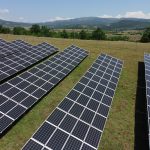On March 25, the European Parliament adopted country enlargement reports assessing the progress towards the EU accession made by Albania, Kosovo, North Macedonia and Serbia. These reports are a response to the annual EU Commission reports on the candidate and potential candidate countries on the path to EU accession. In the adopted reports the Members of the European Parliament highlighted the importance for swift and concrete actions related to energy and environment issues.
All country reports welcome the signing of the Declaration on the Green Agenda for the Western Balkans, in which the countries of the Western Balkans pledge to reach economy wide decarbonization in line with upcoming EU climate law, namely by 2050. However, although the Sofia Declaration is a very important step which sets an overall goal, a number of concrete follow up actions must be planned and implemented if the countries of the Western Balkans are to reach decarbonization.
The significance of the energy transition in the decarbonization efforts has been highlighted in particular for Kosovo, North Macedonia and Serbia. All three depend heavily on coal for electricity production and the reports call on the need to diversify the energy mix towards a systematic coal phase out. Coal subsidies in these Western Balkans countries are an important issue which, as previously argued by CAN Europe on multiple occasions, is one of the reasons the energy transition away from coal is lagging behind.
Air pollution is a choking issue across the region, and the countries are called to comply with the current legal framework on emissions limits. The Energy Community Secretariat has initiated dispute settlement procedures against Bosnia and Herzegovina, Kosovo, North Macedonia and Serbia for failing to comply with their National Emissions Reduction Plans (NERP). Environmental campaigners have already taken legal actions against Serbia’s state-owned electricity company EPS, for breaching the NERP.
With regards to foreign investments, the report on Serbia, in particular, highlights the lack of transparency and environmental and social impact assessment of Chinese investments. Indeed, new coal projects are kept alive, especially in Bosnia and Herzegovina and Serbia, as a consequence of Chinese bank investments.
Western Balkans countries are at a crucial point this year, as they are drafting their National Energy and Climate Plans (NECPs), revising their National Determined Contributions (NDCs) and are preparing for the EU Commission and the Energy Community Secretariat proposal for the 2030 greenhouse gas (GHG), renewables (RES) and energy efficiency (EE) targets.
Postponing to address the potential negative impacts of new coal power plants, and the need for an entire coal phase out, has come to an end. In the last 18 months, Kosovo, Montenegro and North Macedonia have stopped their plans for developing new coal projects. In this respect North Macedonia has been recognised as the regional leader, and is planning a coal phase out before 2030. Despite challenges with the neighboring states to phase out coal, namely Bosnia and Herzegovina, Kosovo and Serbia, there are some low hanging fruits which the countries can and should pick immediately. For example, the European Parliament calls the authorities in Kosovo to fulfil their commitments to decommission the Kosovo A power plant, which should have started in 2017.
Furthermore, commitments made by the governments of all Western Balkans countries, through the Stabilization Association Agreement and the Energy Community Treaty, are far from being respected. Noncompliance or backsliding in policymaking and harmonization of legislation might impact the Instrument for Pre-Accession third package (IPA III), as the Parliament calls for use of conditionality in financing, as well as use of the suspension mechanism.
“The European Parliament’s country enlargement reports on Western Balkans reflect many concerns and calls of the civil society organisations and experts working on climate and energy issues. Conditions are ripe and policymakers in the Western Balkans need to make concrete steps which would ensure a sustainable energy transition towards economy wide decarbonization of the region. This would also be a step closer towards a healthy region as well as towards joining the EU” underlined Viktor Berishaj, Energy Policy Coordinator for South East Europe at CAN Europe.
ENDS
————————————————————————
Contact:
Maša Perović, Southeast Europe Communications Coordinator, CAN Europe (English, Serbian/Bosnian/Croatian)
masha@caneurope.org , +381 (0) 63 8411 566
Viktor Berishaj, Southeast Europe Climate and Energy Policy Coordinator, Climate Action Network (CAN) Europe (English, Albanian, Serbian/Bosnian/Croatian) Viktor@caneurope.org



